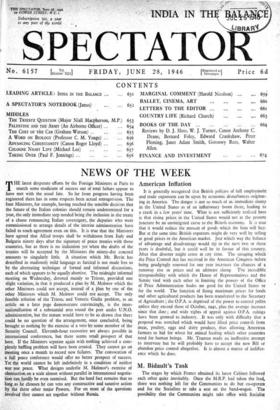NEWS OF THE WEEK HE latest desperate efforts by the
Foreign Ministers at Paris to snatch some modicum of success out of total failure appear to have met with the usual fate. So far from progress having been registered there.has in some respects been actual retrogression. The four Ministers, for example, having reached the sensible decision that the future of the Italian colonies should remain undetermined for a year, the only immediate step needed being the inclusion in the treaty of a clause renouncing, Italian sovereignty, the deputies who were commissioned to arrange details of the interim administration have failed to reach agreement even on this. It is true that the Ministers have agreed that Allied troops shall be withdrawn from Italy and Bulgaria ninety days after the signature of peace treaties with those countries, but as there is no indication yet when the drafts of the treaties will be accepted by the Ministers the ninety-day concord amounts to singularly little. A situation which Mr. Bevin has described in studiously mild language as farcical is not made less so by the alternating technique of formal and informal discussions, each of which appears to be equally abortive. The midnight informal meeting on Wednesday, devoted mainly to Trieste, provided one slight variation, in that it produced a plan by M. Molotov which the other Ministers could not accept, instead of a plan by one of the other Ministers which M. Molotov could not accept. The only feasible solution of the Trieste and Venezia. Giulia problem, as an article on a later page demonstrates convincingly, is the inter- nationalisation of a substantial area round the port under U.N.O. administration, but the statute would have to be so drawn that there could be no question of the arrangement, once concluded, being brought to nothing by the exercise of a veto by some member of the Security Council. Eleventh-hour recoveries are always possible in international conferences, but there seems small prospect of that here. If the Ministers separate again with nothing achieved a com- pletely baffling problem will have been created. They cannot go on meeting once a month to record new failures. The convocation of a full peace conference would offer no better prospect of success. Yet the world cannot be left indefinitely in a condition of neither war nor peace. What designs underlie M. Molotov's exercise of obstruction on a scale almost without parallel in international negotia- tion can hardly be even surmised. But the hard fact remains that so long as he chooses he can veto any constructive and sanative action by the three other major Powers. For on most of the questions involved they cannot act together Without Russia.






























